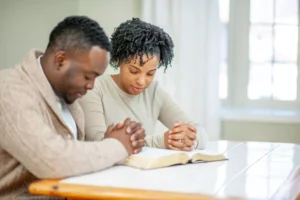I guessed from the beginning how different we were, but Mark is such a good man that I hoped God might move on our behalf. Now one last time, while tears filled my eyes, Mark prayed for me over the phone. After years of long-distance friendship and nine months of serious consideration, he and I had just agreed that we weren’t headed toward marriage.
Almost as soon as I hung up, I thought: How silly of me to hope it would work out.
But stronger still was a sense of God’s presence and a reminder of how much He loves my trust. I’m honored that you hoped in Me.
Yes, I had walked towards Mark in faith. Now I walked away in faith, knowing I might never have such an opportunity again.
In the next four weeks I attended not one but two weddings, and celebrated my darling niece’s first birthday. I was keenly aware that at 40 I was nose-to-nose — again — with a “not yet” for marriage and the possibility that God might say “no, never” to children of my own.
I’m not normally a crier, but Mark and I had talked about celebrating Thanksgiving together — and when it arrived eight weeks post-breakup, he was 1,300 miles away. That morning as I trimmed crusts while making pies, I cut my finger in a grief-fogged fumble — prompting the first of three times I would weep that day.
Hope exposes
Hope upended me. It perched me at the brink of a rollercoaster’s biggest drop. It upped the ante, calling me from the long, practiced patience of single life to what felt like ninja-level faith. Hope complicated many of my closest and most stable friendships, and it found me giving God himself the side-eye. Would He make this relationship all about His purposes — again? And was I willing to let Him? Like a marathon proves the athlete’s resolve, prolonged hope drained me until I was reeling, running with a floppy, uncoordinated gait that left little room for my pride.
In this broken world, hoping makes us vulnerable. Since it can seem like a pretty sure path to pain and discontentment, I’m not surprised that some singles resist praying for a mate. Without assurance that God actually means for us to be married, why would we open our hearts to the possibility? But the Bible permits us to pray about whatever concerns us. In fact, we are commanded to do so: “In everything by prayer and supplication…” (Philippians 4:6) “Continue steadfastly in prayer” (Colossians 4:2).
In the Bible, hope is proactive. It begs, cries, pleads, wrestles, asks for increased faith, sweats drops of blood — and surrenders. Asking for my desire is not a tantrum. It’s not entitlement. Prayer is submitting my desires to God for His decision.
As believers in Jesus, are we obligated to hope for marriage specifically? I think the answer is “no” if we can release that desire in a way that honors God, avoiding such pitfalls as resignation, denial, cynicism or selfishness. But there will be something to hope in Him for.
Hope grows
My friend Joy is my traveling buddy — not geographically (she lives 7,800 miles away), but on the journey of hoping for marriage after 40. When I asked how she finds courage to consider a new relationship, she said: “I pray for it.” Among other things, Joy asks that God will help her trust Him enough to keep her heart soft and open. That He will guard her from cynicism. And, she adds, “I try to give thanks. I thank Him for what He’s teaching me through this. I thank Him for bringing more opportunities so that I don’t think I’m completely undesirable and give up all hope.”
How, in the face of the odds, the disappointments and my own weariness, do I continue to hope — and even grow in hope? Because I’m asking someone who hears prayer, has good gifts for His children, and is the God of “Yes.” I have experienced His character and His personal reassurance. He isn’t capricious and doesn’t play cruel jokes on me, so if I have a strong desire for a good thing, then it’s either His heart to give it to me or to move my heart in the direction of something He knows is better. I don’t always immediately feel that it is better, but I do firmly believe that if I could see what He does, I wouldn’t just be resigned to His will, I would celebrate it.
What stunts my hope? Shame. Misunderstanding God’s purpose. Jumping to conclusions. Forgetting His heart. Letting each disappointment or jealousy reinforce thoughts like I’m a loser, God has forgotten me, or I’m going to get hurt again.
What helps my hope grow? Seeing God’s kindness evident in other details of my life. Allowing Him to guard my heart from taking disappointment personally. And here’s a source of hope that surprised me — suffering.
Romans 5:1-5 says that we boast (or glory, or exult) in tribulations, which in Greek suggests internal pressure, anxiety, burden of heart, persecution, affliction and distress. This crucible leads to a cheerful, steadfast perseverance and from there to proven character, which leads to hope. “And hope,” Paul says, “does not put us to shame.” It doesn’t mean I always get what I want. It means I’m not ashamed, dishonored or deceived by hoping in God.
Hope lives
“Lord,” I prayed, “is this the man I’m waiting for?”
Immediately, this verse came to mind: “And now, O Lord, for what do I wait? My hope is in you.”(Psalm 39:7) I wait for God, not an outcome. I place my hope in Him, not the thing I desire.
In the Old Testament, hope is represented by some 15 Hebrew words which include the concepts of longing, waiting, trust and expectation. In the New Testament, hope and faith are often intertwined. The object of all these things is someone known as “the hope of Israel,” “the God of hope” and “the Holy Spirit of hope.” (Jeremiah 17:13; Romans 15:13) When Mary grieved her brother Lazarus, she thought of resurrection as a distant future event, but Jesus identified resurrection as a living person: himself. My hope, too, is a Person, a “living hope.” (1 Peter 1:3)
Hope is not wishful thinking, or as the Cambridge dictionary puts it, “the imagining or discussion of a very unlikely future event and situation as if it were possible and might one day happen.” Hope is grounded in reality — who God is and the circumstances He allows. Suffering and disappointment sift out the complexities of my heart, blowing away mere wishes and desires, and leaving whatever is grounded in God’s character. Not as I imagine Him to be, but as He truly is.
Hope grieves
Grief, both imagined and real, has been the cost of my past hopes. When Mark hadn’t yet walked away from me, it was an act of faith to resist prematurely grieving the outcome I instinctively expected based on what had happened to me before. When it did come time to say goodbye, I had to accept grieving as my task — at times a messy one.
But grief, I discovered, was cleansing, too. It washed away what wasn’t meant to be permanent, and left some gifts behind, including the healing that came from Mark’s friendship and his Spirit-prompted encouragement. And once the bulk of the task was done, I learned to avoid clinging to grief as my identity.
When vulnerability distorts
When you’re upended by hope, you may be most vulnerable to the very people who are trying to help. At a time when all my nerve endings felt exposed, even those who casually brushed against me could cause pain. I wanted to hear wise counsel, but it took all the maturity and discipline I had to respond well.
In one of the most surprising and painful aspects of this experience, all this vulnerability distorted the words of my closest friends. Though it wasn’t their intent, I “heard” what I feared was true — underlying messages like: Why aren’t you over him yet? Why did you ever let him go? Why did you talk to him for so long if you knew it wouldn’t work? Sometimes, like a cat being rubbed the wrong way, my whole inner being arched backwards in protest.
In the upheaval of hope and grief, it can take significant humility on both sides to come through with existing friendships unscathed. I needed faithful friends who weren’t afraid to ask hard questions and voice difficult truths, who realized they could be completely right in their perspective but completely unhelpful in their delivery, or who could humbly acknowledge, I may not be the one God is using to bring comfort this time.
As the sufferer, I’ve learned to humbly acknowledge, God hasn’t prepared everyone in my life to pass on the specific comfort I need. He’s been very creative to give it to me directly or through unexpected people, and though it’s painful not to be understood instinctively by all my friends, it brings my attention where it belongs — back to Him.
Hope heals
While considering marriage to Mark, my awareness of two facts grew until I was at an impasse: Mark was so dear; we were so different. I couldn’t follow him; how could I walk away? But when the moment came to choose, the faith to choose came too.
In my circumstances, having hope end in more grief could have felt like some cruel cosmic joke. But even as I worked through the sadness and fears, I was astonished to walk away from that dashed hope with a heart more whole.
A decade ago, I hoped and was disappointed and felt abandoned by God. It left a mark on my heart, a rift in my trust for Him. But now, unmistakably, I saw: He came through for me. And I knew that the previous “abandonment” was a lie.
How would a heart transplant appear to a small child, too young to know that what looks like amputation is actually restoration? I am that child, still learning to see God as a surgeon, not a saboteur. (Job 5:18; Deuteronomy 32:39; Hosea 6:1)
Is there a person more vulnerable than the unconscious patient on the operating table, his vital organs exposed, dependent on the skill of others to bring him back to life? Clumsy human efforts to change our character or our circumstances may leave us utterly undone, but not so our heavenly Surgeon. Scalpel in hand, He wounds. Needle in hand, He begins to heal — and He brings that healing to perfection.
Hoping in God may seem audacious. But it’s the most reasonable choice I can make in this broken world.
Copyright 2019 Elisabeth Adams. All rights reserved.











